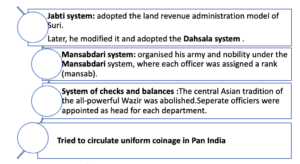13 July 2023 : Daily Answer Writing
Mains Answer Writing
One of the key components of these exams is the written test, which consists of a number of essay and comprehension questions. Candidates are expected to write clear and well-structured answers that demonstrate their knowledge and understanding of the topics being tested.
13-July-2023
Q. The efficient administrative innovations of Akbar brought stability to North Indian Polity for two centuries. Analyse the success of Mughal Administrative innovations in this context. (250)
The Mughal Empire was a bureaucratic government with a highly centralised system, where the Mughal emperor was the supreme authority. According to Akbarnama, most of the administrative innovation was instituted during the era of the emperor Akbar.
Some of the efficient administrative innovations of Akbar:
Analysis of the success of Mughal Administrative innovations:
- Efficient collection of land Revenue: Historians like Irfan Habib opined that the high centralisation of administration is manifested in the efficient working of the land revenue system, Mansabdar and Jagir and so on.
- Efficient Revenue tracking: The Dahsala system (10-year survey) confirms that there were no uncertainties in the amount to be paid to the government, allowing the farmers to know exactly how much should be paid to the government. This boosted the royal treasury immensely. Strong revenue means a strong military and a strong military means a strong government.
- Effective Control over Nobility: In the early Mughal era, the emperor was the source of all powers, and bureaucracy was mere banda-i dargah. Though the principal ministers enjoyed a wide range of power, they Were not allowed to usurp and interfere in each other’s jurisdiction.
- There was no possibility for central ministers to assume autocratic powers as done by the Corps of Forty. Through a system of checks and balances, any minister or officer was prevented from gaining unlimited powers, which provided a strong, accountable empire that survived for the next 200 years.
- The use of uniform coinage in Pan India boosted the trading system, leading to more revenue generation.
Criticism:
- Jagirdari Crisis: There were not enough Jagirs, as many as the Mansabdars. There always was a scope of resentment. The system worked only till the emperors were strong.
- Strong Nobility: Mansabdars were in control over a large number of cavalry and revenue assignments. Which enabled them to declare independence as soon as the imperial power weakened.
- One Family Affair: Historians like Stephen P. Blake and J.F. Richards accepted the centralising tendencies and pointed out that the Mughal Empire was ‘patrimonial bureaucratic’. For them, everything centred around the imperial household and the vast bureaucracy.
- Chetan Singh’s opined that jagir transfers were not as frequent as they looked, and the local elements at the periphery were quite successful in influencing the policies at the centre.
Conclusion: Thus, the innovative elements of the Mughal administration were not new. But it was effective till a strong ruler was on the throne. Nonetheless, it was effective enough to keep North India politically united for a long time.
Upload Answer here
For Enquiry

13 July 2023 : Daily Answer Writing

12 July 2023 : Daily Answer Writing

11 July 2023 : Daily Answer Writing

10 July 2023 : Daily Answer Writing

9 July 2023 : Daily Answer Writing

8 July 2023 : Daily Answer Writing

3 August 2023 : Daily Quiz

3 August 2023 : PIB

Prelims : 2 Aug 2023 : Daily Answer Writing

Prelims : 1 Aug 2023 : Daily Answer Writing




